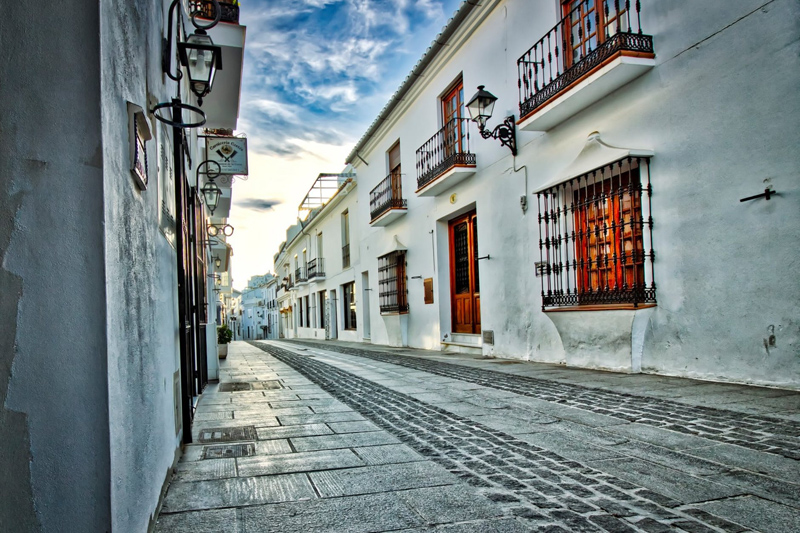El fin de las vacaciones – Spanish genders

Previous related articles:
1.1. El fin de las vacaciones – Listening and reading
1.2. El fin de las vacaciones – Spanish articles
Reviewing last article, about Spanish definite and indefinite articles, you’ll remember they are classified according to their gender. They can be either masculine or feminine, according to the name (noun) they precede. For example, the article “el” in “el caballo” (“the horse”), is singular masculine, as the noun (“caballo”) is masculine.
The same way, “la” in “la cama” (“the bed”), is feminine, as the noun “cama” is feminine.
But, how do we know when a noun is either masculine or feminine?
You can know this the “easy” way. Just look for that word on the dictionary, and close to it, you’ll read either “m” (for masculine) or “f” (for feminine).
But before doing this, let’s review the rules for Spanish masculine and feminine.
Spanish masculine words:
General rule: Masculine words end in –o.
Examples: el perro (dog), el gato (cat), el libro (book), blanco (white)
Other endings of masculine words: -e
Examples: el aceite (oil), el oeste (west), el oriente (east), el jefe (boss).
-an
Examples: el mazapán (marzipan, typical Christmas sweet in Spain), el ademán (gesture), el pan (bread), el huracán (huracane)
-or
For example: el amor (love), el calor (heat), el color (color), el terror (horror)
-aje
Examples: el traje (costume), el viaje (trip), el masaje (massage), el encaje (lace)
-in
Examples: el maletín (briefcase), el comodín (wildcard), el fin (end)
Remember names of days of the week, seasons, rivers, lakes, seas or oceans are also masculine:
El lunes, el verano, el Rin, el Titicaca, el Mediterráneo, el Pacífico.
Spanish feminine words:
General rule: Feminine words end in –a.
Other endings of feminine words:
-ción
la canción (song), la nación (nation), la organización (organization), la sanción (sanction).
-sión
Examples: la ilusión (illusion), la profesión (profession), la diversión (fun), la versión (version).
-tud
Some examples: la juventud (youth), la altitud (altitude), la actitud (attitude), la virtud (virtue).
-dad
Examples: la universidad (university), la verdad (the truth), la edad (age), la igualdad (equality).
So, these are the rules for masculine and feminine words. There are other words not following these rules, that is, exceptions. But this will be reviewed on future articles.
I have prepared a set of quizzes, as the best way to understand how these gender rules work in Spanish is practice.
These quizzes are totally free, and you can find them here: Gender and number agreement in Spanish - Quizzes
1.1. El fin de las vacaciones – Listening and reading
1.2. El fin de las vacaciones – Spanish articles
Reviewing last article, about Spanish definite and indefinite articles, you’ll remember they are classified according to their gender. They can be either masculine or feminine, according to the name (noun) they precede. For example, the article “el” in “el caballo” (“the horse”), is singular masculine, as the noun (“caballo”) is masculine.
The same way, “la” in “la cama” (“the bed”), is feminine, as the noun “cama” is feminine.
But, how do we know when a noun is either masculine or feminine?
You can know this the “easy” way. Just look for that word on the dictionary, and close to it, you’ll read either “m” (for masculine) or “f” (for feminine).
But before doing this, let’s review the rules for Spanish masculine and feminine.
Spanish masculine words:
General rule: Masculine words end in –o.
Examples: el perro (dog), el gato (cat), el libro (book), blanco (white)
Other endings of masculine words: -e
Examples: el aceite (oil), el oeste (west), el oriente (east), el jefe (boss).
-an
Examples: el mazapán (marzipan, typical Christmas sweet in Spain), el ademán (gesture), el pan (bread), el huracán (huracane)
-or
For example: el amor (love), el calor (heat), el color (color), el terror (horror)
-aje
Examples: el traje (costume), el viaje (trip), el masaje (massage), el encaje (lace)
-in
Examples: el maletín (briefcase), el comodín (wildcard), el fin (end)
Remember names of days of the week, seasons, rivers, lakes, seas or oceans are also masculine:
El lunes, el verano, el Rin, el Titicaca, el Mediterráneo, el Pacífico.
Spanish feminine words:
General rule: Feminine words end in –a.
Other endings of feminine words:
-ción
la canción (song), la nación (nation), la organización (organization), la sanción (sanction).
-sión
Examples: la ilusión (illusion), la profesión (profession), la diversión (fun), la versión (version).
-tud
Some examples: la juventud (youth), la altitud (altitude), la actitud (attitude), la virtud (virtue).
-dad
Examples: la universidad (university), la verdad (the truth), la edad (age), la igualdad (equality).
So, these are the rules for masculine and feminine words. There are other words not following these rules, that is, exceptions. But this will be reviewed on future articles.
I have prepared a set of quizzes, as the best way to understand how these gender rules work in Spanish is practice.
These quizzes are totally free, and you can find them here: Gender and number agreement in Spanish - Quizzes
You Should Also Read:
El fin de las vacaciones – Listening and reading
El fin de las vacaciones – Spanish articles

Related Articles
Editor's Picks Articles
Top Ten Articles
Previous Features
Site Map
Content copyright © 2023 by Angeles Fernández. All rights reserved.
This content was written by Angeles Fernández. If you wish to use this content in any manner, you need written permission. Contact Angeles Fernandez for details.






